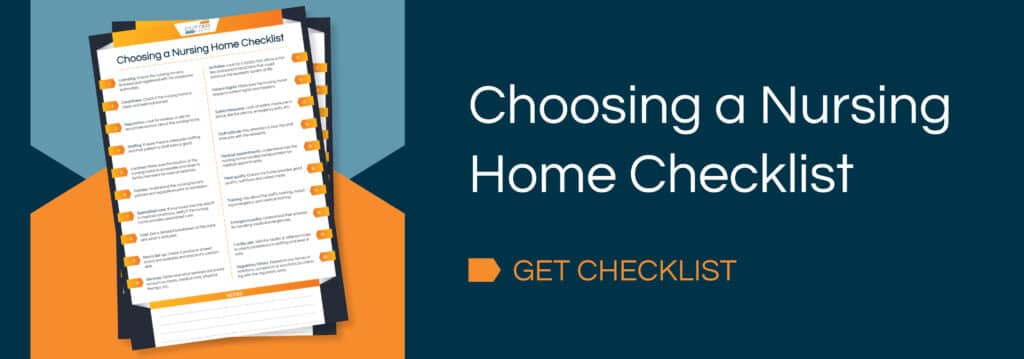5 Steps to Choosing the Right Nursing Home for Your Loved One
This comprehensive guide explains everything you need to know about choosing a nursing home, including what signs indicate someone may need nursing home care, how to evaluate facilities to find safe, consistent, and compassionate care, and how to manage insurance and finances. Cutter Law P.C. provides this complimentary guide to help you make the best decision for your loved ones.
Finding the right nursing home for your loved ones takes due diligence. Unfortunately, not all facilities provide high-quality and compassionate care. While only four percent of nursing homes have been cited for failing government inspections, as many as a third of all facilities fail to meet federal benchmarks for nurse and aide staffing. According to the American Health Care Association, more than three-quarters of nursing homes have moderate to high levels of staffing shortages, which can impact services and lead to neglect.
Staffing is just one area you will want to consider when evaluating care facilities. Some other key considerations include the facility’s track record of complaints, accreditation from independent organizations, recommendations from those you trust, and the staff’s level of training.
Cutter Law P.C. presents this guide on how to find a nursing home. Learn the information you need to make an informed choice and what to look for when you visit. Before we talk about how to find a nursing home, however, it’s important to first know when nursing care is right for your loved one.
Assess the Need for Nursing Care
How do you know if your loved one needs nursing care? Some key signs to look for include the following:
- Difficulty with daily activities, such as bathing, eating, dressing, and self-care
- Dealing with cognitive decline, including dementia or impaired judgment
- Needing specialized treatment for complex medical conditions
- Suffering from frequent falls or lack of mobility
Caring for the elderly can be overwhelming. When caregivers and family members get burned out, it may also be time to consider nursing care.
How to Choose a Nursing Home: Finding Quality Care
Check Accreditation
Look for nursing homes accredited by independent organizations that set care standards and inspect facilities. Accreditation demonstrates that a facility meets the criteria for quality and safety. Several organizations accredit nursing homes, including:
Medicare.gov is also a resource to check whether nursing homes are Medicare-certified.
Review Track Record
Nursing homes must provide a reasonable standard of care. Unfortunately, not all facilities live up to their obligations. It’s estimated that one out of 10 people over 60 are victims of elder abuse. While cases of elder abuse can happen anywhere, it’s important to check out a facility’s history when it comes to claims of abuse and neglect, such as the following:
Medicare provides the Nursing Home Care Compare website to help families and caregivers compare nursing homes. The site uses a quality rating system that gives each nursing home a rating of between one and five stars, assessing each facility’s health inspections, staffing, and quality measures.
You can contact your state’s public health department to see if a nursing home has a history of complaints or citations. For example, California combines data from state licensing management databases and the Center for Health Care Quality in a searchable database.
Ask for Recommendations

Another good idea is to ask for recommendations. A good place to start is with your loved one’s doctor. They understand the medical needs and may be familiar with local options. Physicians can also help you with what questions you need to ask when considering a nursing home.
If your loved one has been hospitalized recently, the hospital’s discharge planner may also be a good source for recommendations.
Don’t overlook friends or family that can provide personal experience. First-hand reports of conditions, care, and communication can be extremely valuable.
Visit and Tour Nursing Homes
Visiting nursing homes to see conditions first-hand is crucial. Get a general sense of conditions and an opportunity to ask direct questions.
Federal law requires nursing homes to provide enough staffing to safely care for residents, but there is no federal standard for staffing levels. Medicare suggests inquiring about turnover for nursing staff, managers, and administrators. Frequent turnover may indicate problems.
Also, ask about the ratio of staff to residents for each shift and the ratio of staffing hours per resident day. While there is no set ratio, the Coalition of Geriatric Nursing Organizations recommends these minimum staffing levels:
A registered nurse should be present and available at all times.
The hours of direct nursing care for each resident should be at least 4.1 hours per day.
Licensed nurses provide at least 30 percent of nursing care.
Check for Cleanliness
A dirty facility is a warning sign. Check for cleanliness in common areas and resident rooms. Bathrooms, kitchens, counters, and other furnishing should be in good condition with no obvious stains. Do a spot check to see if bathrooms have adequate supplies, towels, toilet paper, and soap.
Use Your Senses
Do more than just look around. Using your other senses, you can pick up on how nursing home facilities operate. For example, listen for bells that ring consistently. This might indicate understaffing, preventing staff from attending to resident needs promptly.
Use your nose, too. Odd smells or strong odors may indicate poor hygiene or failure to follow regular cleaning regimens.
Talk to Staff and Residents
Pay attention to how staff interacts with patients. Are they friendly and treat residents with respect? Talk to current residents to see how they feel about the quality of care, activities, and food. Do they seem happy, or are they withdrawn and sullen?
It’s important to engage with staff and residents, not just the tour guide, who will tell you all the positives about the facility.
Look for Safety Systems
During the tour, take note of safety systems. This should include the following:
- Clearly marked exits
- Handrails in hallways
- Grab bars in bathrooms
- Security protocols for visitors
- Secure and monitored entrances and exits
Understand Visitation Policies
Ask about visiting hours and whether there are any restrictions for families. The more flexible the hours are, the more connected you can stay with your loved ones.
Review Activity Calendars
Different residents will have varying medical conditions. Look for a variety of activities that match the interests and abilities of your loved ones. Social engagement is an important part of the quality of life.
Review Options, Costs, and Contracts
An important part of how to find a nursing home is understanding the costs and options. Explore the financial details associated with nursing care—such as whether insurance coverage, Medicare/Medicaid assistance, or other financial aid is available. Depending on the ability to pay, there may also be a sliding scale of fees.
Many facilities offer different rates for different levels of care, so you will want to ensure you get the right type of care and can afford it. Other details to consider include the following:
- What additional cost might be charged, such as transportation or pharmacy fees
- Frequency of rate increases
- Upfront deposits and payment terms
- Options, such as private or shared rooms
If You Suspect Nursing Home Abuse, We Can Help
Following these recommendations can help you make a more informed decision about nursing home care for your loved ones.
Unfortunately, even taking these steps cannot guarantee your loved one won’t be subjected to abuse or neglect at a nursing home. When caregivers do not provide the proper standard of care, you can take legal action to hold them accountable and claim compensation for your loved one’s suffering.
If you suspect nursing home abuse or negligence, contact Cutter Law P.C. for a free case review. Cutter Law P.C. is a California nursing home abuse law firm representing clients throughout California, including Sacramento, Oakland, Santa Rosa, and nationwide. With more than 50 years of combined legal experience, Cutter Law attorneys fight for families.

